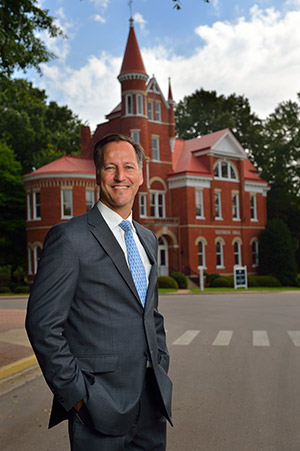
Dean Rich Forgette
This academic year will be a time of transition, growth, and opportunity for the College of Liberal Arts.
The transition is due to changing leadership. Dean Glenn Hopkins retired after 16 years of service. He has been an incredible leader for the College, a steady hand in managing growth and change. UM had 8,712 undergraduates in Fall 1998 when Dean Hopkins began his tenure. By 2013, it had grown to 15,782, 80% over the 15 years.
Beyond the numbers, Dean Hopkins has been a leader in transforming our academic programs. He helped create the Croft Institute for International Studies, the Lott Leadership Institute, the Chinese Flagship Program, and many other academic enrichments.
Above all, Glenn has served always with great integrity and sound judgment. The College flourished under his leadership. We are profoundly grateful for his incredible service. His work will have a lasting legacy for future generations.
I will be serving this year as interim Dean. It will be a big challenge, and I am honored to serve. While this will be a transition year, we cannot afford to stand still. The growth and opportunities of the university require immediate planning and action.
Growth at the university means that we can help more people prepare for productive and fulfilling lives. Undergraduate enrollment has grown by almost 30% in the last five years, and this year’s first-year class of about 3,900 students is approximately 350 more than the previous year.
The College continues to be the heart of the University of Mississippi, providing the foundation necessary for the university’s overall growth and success. If you think about the university as our Champion Tree, the giant catalpa in front of our Student Union, the College is the trunk and roots. Because we deliver the core curriculum, every student is part of the College in practice, not just those majoring in one of our 18 departments. In recent years, the College has produced about two-thirds of all undergraduate student credit hours in the university.
We are not only teaching more students, we are also retaining and graduating those students. The College has instituted retention programs such as FASTrack, Grove Scholars, and Biology Bootcamp, and we have placed greater resources for an emphasis in student advising and supplemental instruction. These investments are paying off. Our percentage of students retained after the first-year grew from 78% in 2007 to 85.6% in 2013, and our number of undergraduate degrees conferred has increased by more than 20% over the past five years. The College of Liberal Arts is leading the way in promoting student success as the university grows.
This growth brings huge opportunities and challenges. The university is completing a significant addition to Coulter Hall and we are beginning to design a new integrated science building, an effort spearheaded by Dean Hopkins. The Coulter Hall project will make more room for our science classes. The integrated science building is projected to be completed by Fall 2018. It will transform science, health, and engineering education for future generations.
Our special section in this issue highlights health and science education in the College of Liberal Arts. We are expanding undergraduate research opportunities, adding resources for health profession advising, and hiring new science faculty. Our goal is to better prepare the next generation of doctors, nurses, and other health professionals, vital work in our medically underserved state and region.
Now more than ever, we need our alumni to be engaged with the College. I ask you to consider how you might give back so that together we can improve the College. Please visit with me and other faculty at one of two tailgate tents during the Ole Miss–Memphis football game (September 27) and the Ole Miss–Auburn game (November 1). We will be right in front of Ventress Hall. I look forward to meeting you and hearing your ideas for the College of Liberal Arts. My sincere and deep thanks to all who have provided support during this last year. Our growth and success would not be possible without your commitment.
To contact the College, email or call 662.915.7178. Join the conversation on Facebook and Twitter.